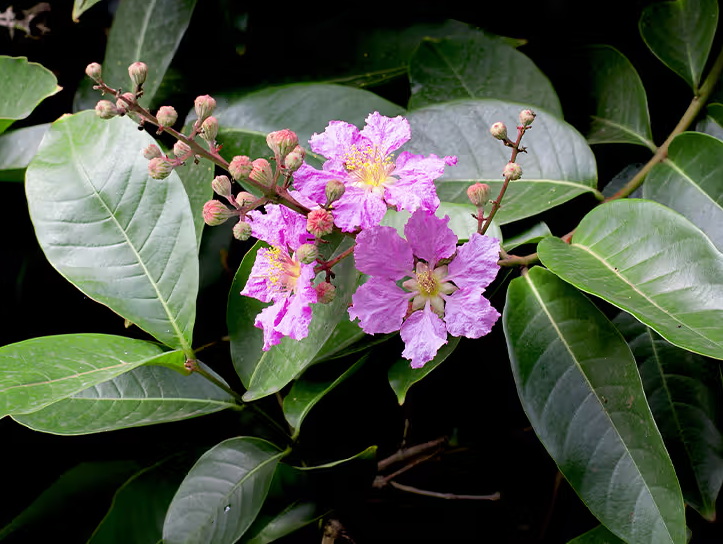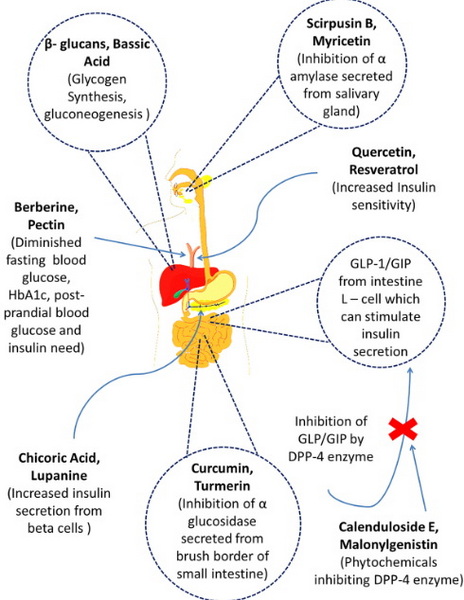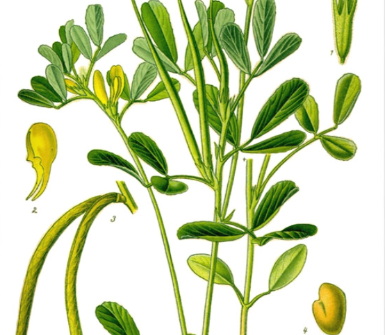Content Menu
● Introduction to Banaba Leaf Extract
>> Key Compounds in Banaba Leaf Extract
● Mechanisms of Blood Sugar Regulation
● Studies on Banaba Leaf Extract
● China's Role in Promoting Banaba Leaf Extract
● Safety and Efficacy
● Broader Health Benefits
● Integration with Traditional Chinese Medicine
● Future Perspectives
● Cultural Significance of Banaba Leaf in Traditional Medicine
● Modern Applications and Innovations
● Regulatory Frameworks and Quality Control
● Conclusion
● FAQs
>> 1. What are the main compounds responsible for the antidiabetic effects of Banaba leaf extract?
>> 2. How does China Banaba Leaf Extract reduce blood glucose levels?
>> 3. Are there any reported side effects of using Banaba leaf extract?
>> 4. Can Banaba leaf extract be used alongside conventional diabetes medications?
>> 5. What other health benefits does Banaba leaf extract offer?
● Citations:
Banaba leaf extract, derived from the Lagerstroemia speciosa plant, has been traditionally used in folk medicine for its potential health benefits, particularly in managing blood sugar levels. In China, this extract has gained attention for its antidiabetic properties, attributed to compounds like corosolic acid and ellagitannins. This article explores how China Banaba Leaf Extract contributes to blood sugar regulation and its broader health implications.

Introduction to Banaba Leaf Extract
Banaba leaves have been used for centuries in traditional medicine, especially in Southeast Asia. The first published research on its hypoglycemic effects dates back to 1940, highlighting its potential in diabetes management. The extract is rich in bioactive compounds that not only help regulate blood sugar but also offer antioxidant and anti-obesity benefits.
Key Compounds in Banaba Leaf Extract
- Corosolic Acid: Known for its insulin-like effects, corosolic acid enhances glucose uptake, increases insulin sensitivity, and inhibits alpha-glucosidase, an enzyme involved in carbohydrate digestion.
- Ellagitannins: These compounds contribute to the extract's antioxidant properties and may play a role in glucose metabolism.
Mechanisms of Blood Sugar Regulation
China Banaba Leaf Extract works through several mechanisms to regulate blood sugar levels:
1. Enhanced Cellular Glucose Uptake: By increasing insulin sensitivity, the extract facilitates the uptake of glucose by cells, thereby reducing blood glucose levels.
2. Impaired Hydrolysis of Sucrose and Starches: The inhibition of alpha-glucosidase slows down the digestion of carbohydrates, leading to a gradual increase in blood glucose levels.
3. Decreased Gluconeogenesis: The extract reduces the production of glucose in the liver, which is beneficial for managing diabetes.
4. Antioxidant Activity: Banaba leaf extract's antioxidant properties help mitigate oxidative stress, which is often associated with diabetes complications.
Studies on Banaba Leaf Extract
Numerous studies have demonstrated the efficacy of Banaba leaf extract in regulating blood sugar levels:
- Animal Studies: In diabetic mice and rats, Banaba leaf extracts have shown significant reductions in blood glucose levels. For instance, a study using streptozotocin-diabetic rats found a 43% decrease in fasting blood glucose levels after administering a hot water extract of Banaba leaves.
- Human Studies: Corosolic acid, a key component of Banaba extract, has been shown to decrease blood sugar levels within 60 minutes in human subjects. No adverse effects have been reported in human trials.
China's Role in Promoting Banaba Leaf Extract
China has been actively involved in researching and promoting Banaba leaf extract for its health benefits. The country's pharmaceutical and nutraceutical industries have developed various formulations incorporating Banaba extract, often combining it with other herbs to enhance its effects.
Safety and Efficacy
Banaba leaf extract is generally considered safe with no reported adverse effects in human studies. Its efficacy in managing blood sugar levels, combined with antioxidant and anti-inflammatory properties, makes it a promising natural remedy for diabetes management.

Broader Health Benefits
In addition to its antidiabetic properties, China Banaba Leaf Extract offers several other health benefits:
- Antioxidant Properties: The extract's antioxidant activity helps protect against oxidative stress, which is linked to various chronic diseases, including heart disease and cancer.
- Anti-Obesity Effects: Some studies suggest that Banaba leaf extract may aid in weight management by inhibiting fat absorption and enhancing fat metabolism.
- Cardiovascular Health: By improving insulin sensitivity and reducing inflammation, Banaba leaf extract may help mitigate cardiovascular risks associated with diabetes.
Integration with Traditional Chinese Medicine
In China, Banaba leaf extract is often integrated with traditional Chinese medicine (TCM) to enhance its therapeutic effects. TCM emphasizes holistic treatment approaches, combining herbal remedies with lifestyle modifications to manage chronic conditions like diabetes.
Future Perspectives
As research continues to validate the efficacy of China Banaba Leaf Extract, it is likely to become a more prominent component in diabetes management strategies worldwide. Its potential for integration with conventional treatments and its safety profile make it an attractive option for those seeking natural remedies.
Cultural Significance of Banaba Leaf in Traditional Medicine
Banaba leaves have been deeply rooted in traditional medicine across Southeast Asia, particularly in the Philippines and India. The cultural significance of these leaves lies in their historical use as a natural remedy for various ailments, including diabetes. This cultural context highlights the importance of preserving traditional knowledge and integrating it with modern healthcare practices.
Modern Applications and Innovations
In recent years, there has been a surge in innovative applications of Banaba leaf extract, from dietary supplements to functional foods. The extract is often combined with other natural ingredients to enhance its efficacy and appeal to a broader consumer base. This trend reflects a growing interest in natural health products and the potential for Banaba leaf extract to become a mainstream ingredient in the health and wellness industry.
Regulatory Frameworks and Quality Control
The regulation of dietary supplements, including those containing Banaba leaf extract, varies globally. In China, the regulatory framework emphasizes quality control and safety standards to ensure that products meet consumer expectations. This includes rigorous testing for purity and potency, as well as compliance with good manufacturing practices (GMP).
Conclusion
China Banaba Leaf Extract offers a natural and potentially effective way to regulate blood sugar levels, thanks to its bioactive compounds like corosolic acid and ellagitannins. With its safety profile and efficacy demonstrated in various studies, it is a valuable addition to diabetes management strategies. However, it is essential to consult healthcare professionals before using any new supplements.

FAQs
1. What are the main compounds responsible for the antidiabetic effects of Banaba leaf extract?
The primary compounds are corosolic acid and ellagitannins, which enhance glucose uptake and exhibit antioxidant properties.
2. How does China Banaba Leaf Extract reduce blood glucose levels?
It enhances cellular glucose uptake, impairs carbohydrate digestion, reduces gluconeogenesis, and exhibits antioxidant activity.
3. Are there any reported side effects of using Banaba leaf extract?
No adverse effects have been reported in human studies, making it generally safe for consumption.
4. Can Banaba leaf extract be used alongside conventional diabetes medications?
It is advisable to consult a healthcare professional before combining Banaba leaf extract with other medications.
5. What other health benefits does Banaba leaf extract offer?
In addition to blood sugar regulation, it provides antioxidant, anti-obesity, and anti-inflammatory benefits.
Citations:
[1] https://magistralbr.caldic.com/storage/product-files/1201045165.pdf
[2] https://nopr.niscpr.res.in/bitstream/123456789/11006/1/IJEB%2049(2)%20125-131.pdf
[3] https://patents.google.com/patent/JPH05310587A/en
[4] https://pubmed.ncbi.nlm.nih.gov/22095937/
[5] https://pmc.ncbi.nlm.nih.gov/articles/PMC3468018/
[6] https://patents.google.com/patent/CN106176953A/zh
[7] https://www.healthline.com/nutrition/banaba-leaf
[8] https://onlinelibrary.wiley.com/doi/abs/10.1002/ptr.3664
[9] https://patents.google.com/patent/CN103859378A/zh
[10] https://patents.google.com/patent/CN106306817A/zh






























